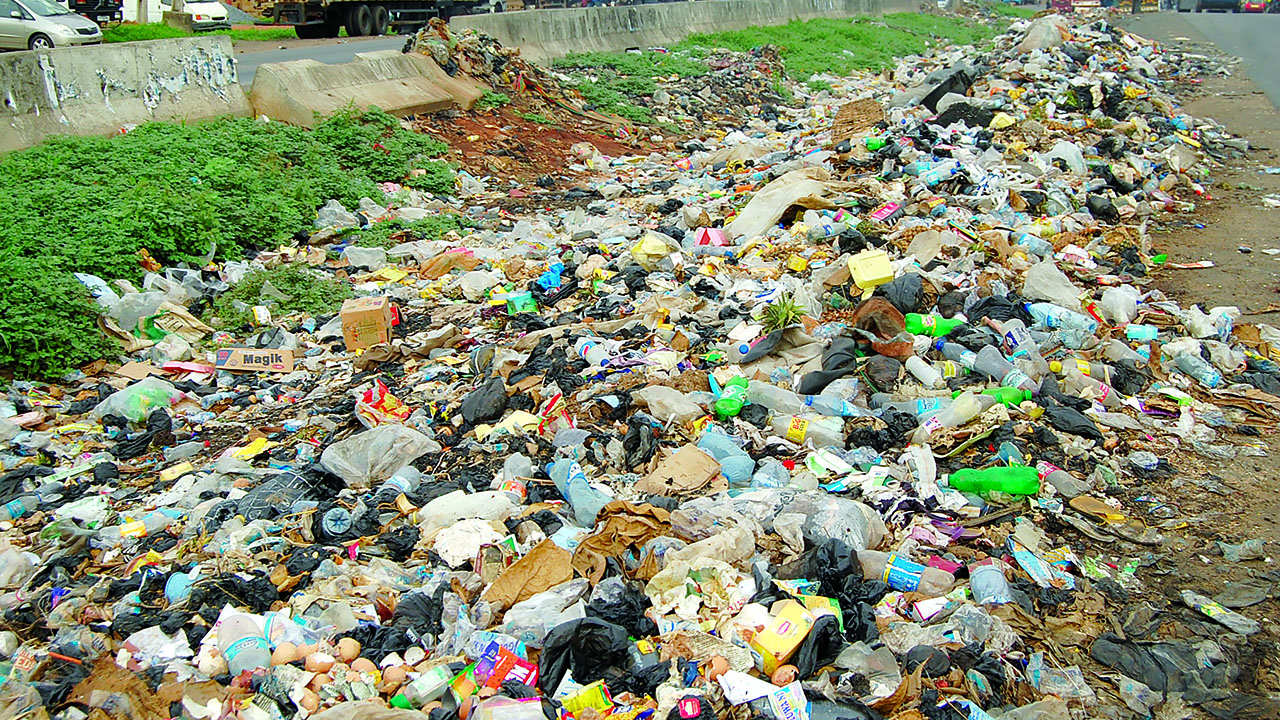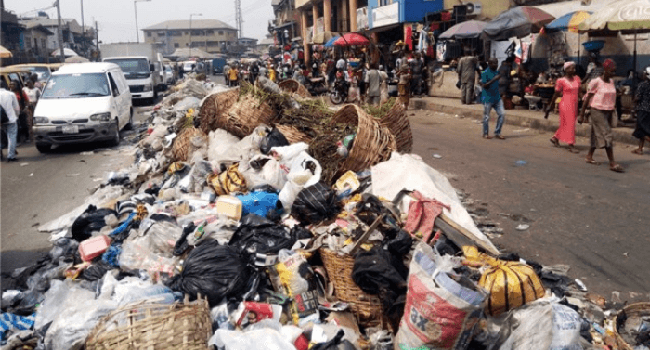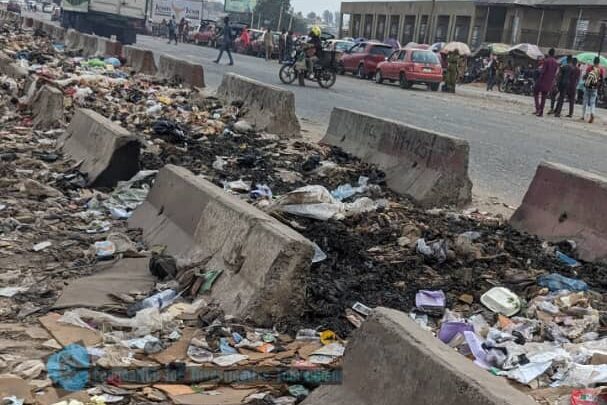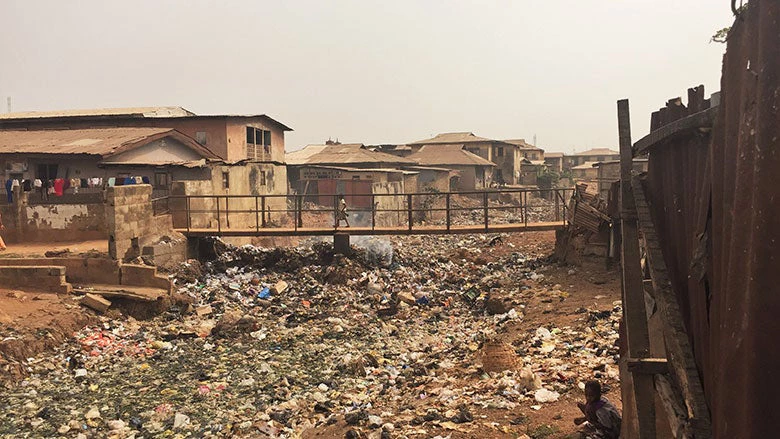 In the bustling city of Ibadan, the challenge of waste management and disposal has become endemic. Behind the facade of streets, described by John Pepper Clark as, a ‘running splash of rust and gold- flung and scattered among seven hills like broken china in the sun’, are poorly managed dumpsites threatening lives of residents.
In the bustling city of Ibadan, the challenge of waste management and disposal has become endemic. Behind the facade of streets, described by John Pepper Clark as, a ‘running splash of rust and gold- flung and scattered among seven hills like broken china in the sun’, are poorly managed dumpsites threatening lives of residents.
The city is serviced by four dumpsites namely: Lapite, Ajakanga, Aba- eku and Awotan, all located in Akinyele, Oluyole, Ona- ara and Ido councils, respectively. The four dumpsites are solely managed by the state government through the Oyo State Waste Management Authority ( OYOWMA).
According to OYOWMA, Aba- eku is the oldest dumpsite established in 1985 while the largest dumpsite is Awotan occupying 20 hectares followed by Ajakanga 10, Aba- eku 9.4 and Lapite 9.
The Guardian gathered that the waste deposited at Ajakanga dumpsite is the highest with 162, 117 metric tons yearly followed by Aba- eku, Awotan, and Lapite ( 102, 705, 95, 775, and 87, 218) respectively. And over the years, these dumpsites have been emitting noxious fumes and odors making life unbearable for residents.
These sites, which were said to be initially small landfill, have now turned into a massive dumpsites that are underregulated and lack infrastructure for waste management, as a result, the site are constantly overflowing with waste. Located in different neighbourhoods, these dumpsites are overflowing with all sorts of waste from household garbage to industrial by- products. The lack of proper water management infrastructure coupled with the city’s rapid urbanisation has only exacerbated the problem.
As a result, these dumpsites have become breeding grounds for disease, air and water pollution and a source of environmental health hazards for residents living nearby.
These waste disposal sites, once meant to handle the city’s waste in an efficient and sanitary manner, have become a looming threat to the health and well being of the local communities.
From environmental degradation to public health risks, the consequences of these poorly managed dumpsites are far reaching and demand urgent attention.
Angered by the threat these sites posed and health challenge faced by residents, who are always visiting the hospital because of respiratory problems and other illnesses, the Oyo State House of Assembly called on the executive arm, through the waste management authority, to implement and enforce strict waste regulations at Lapite dumpsite to control the waste at the site.
 This followed a motion brought to the House by the member representing Akinyele state constituency 1, Hon. Lekan Abiola, during plenary.
This followed a motion brought to the House by the member representing Akinyele state constituency 1, Hon. Lekan Abiola, during plenary.
According to Abiola, the Lapite dumpsite on the OyoIbadan Expressway is reeking out disgusting smell to people in the communities and road users thereby becoming an alarming threat to both human health and the environment.
Abiola also hinted that the practice of burning waste at the Lapite dumpsite is causing severe air pollution, noting that the harmful chemicals and particles released during burning are a direct threat to the respiratory health of nearby residents.
He said: “Without immediate intervention, the health risks and environmental damage caused by the Lapite dumpsite will continue to escalate. The well- being of the community and the preservation of the local ecosystem are at stake.
“The unchecked disposal of waste at this site, driven by rapid population growth, industrial activities, and urbanisation, has led to severe environmental damage. The disturbing practice of burning waste at the dumpsite adds to the problem by releasing harmful fumes into the atmosphere, endangering the health of nearby residents,” Abiola said.
The lawmaker, however, stressed the need for government to enforce 100m setback and perimeter fencing around the dumpsites.
Considering the motion, lawmakers on the floor of the House decried indiscriminate dumping of refuse by residents, which they said was capable of causing erosion and flooding especially during rainy season.
Reacting, Speaker of the House, Rt Hon. Adebo Ogundoyin, called on the executive to develop and implement a detailed waste management plan that includes regular monitoring, effective waste segregation, recycling, and safe disposal methods.
Ogundoyin also urged the executive, through the Ministry of Information, to launch awareness campaigns and educational programmes to inform the public about the dangers of improper waste management and encourage community participation in maintaining environmental health.
 During a visit to Lapite dumpsite, residents of the community said they have been facing this hazard for years. They noted that several complaints were made to government but nothing concrete has come out except government’s promises.
During a visit to Lapite dumpsite, residents of the community said they have been facing this hazard for years. They noted that several complaints were made to government but nothing concrete has come out except government’s promises.
Noting that these dumpsites have led to a decline in the quality of life for residents, they said the heaps of garbage make it unbearable for people to even step outside their homes, let alone enjoy their surroundings.
While also lamenting the smoke from the burning of waste materials, which creates a thick haze that hangs over the community, a resident, who gave his name as Ikudaisi, said the stench from the dumpsites stifles breath.
He said, “the uncontrolled decomposition of organic waste releases methane gas and other harmful pollutants into the air that contribute to respiratory ailments and other health problems among residents. The leaching of toxic chemicals from the waste into the soil and groundwater further compounds the issue, posing a serious threat to the health of the entire community.”
Experts who spoke to The Guardian on the environmental consequences of these poorly managed dumpsites said the end result is erosion and loss of biodiversity in the surrounding areas.
According to them contamination of water sources with hazardous substances poses a grave risk to both human and animal populations, with long- term implications for the ecosystem as a whole.
It was learnt that property values in the vicinity of these sites have plummeted, making it difficult for residents to sell their homes or attract new businesses to the area.
A resident of Olukitila Village, in Akinyele community, who has been living in the environment for 15 years, Akeebu Azeez, expressed deep concern about the burning of refuse at the nearby dumpsite affecting the local community.
“The burning of refuse at the dumpsite severely affects us residents. The smell and swarms of flies are unbearable. Instead of disposing of the waste far from the roadside, they dump it nearby, causing congestion that makes it difficult for two vehicles to pass,” said Azeez. “Despite our repeated appeals, authorities have not addressed this issue.”
 Continuing, Azeez noted that the “burning of waste has even resulted in fatalities. Often, accidents occur because the smoke and flames obscure visibility for drivers and pedestrians. We urgently call on the government to intervene and remove the waste from our environment, especially with the current cholera outbreak.
Continuing, Azeez noted that the “burning of waste has even resulted in fatalities. Often, accidents occur because the smoke and flames obscure visibility for drivers and pedestrians. We urgently call on the government to intervene and remove the waste from our environment, especially with the current cholera outbreak.
“Many residents have already relocated owing to the health hazards posed by this dumpsite. The situation has become untenable.”
Lamenting the situation, Faith Ayanwale said: “Financial constraints prevent many of us from installing proper water filtration systems, leaving us dependent on purchasing sachet water for our daily needs. This situation has worsened over the years.






